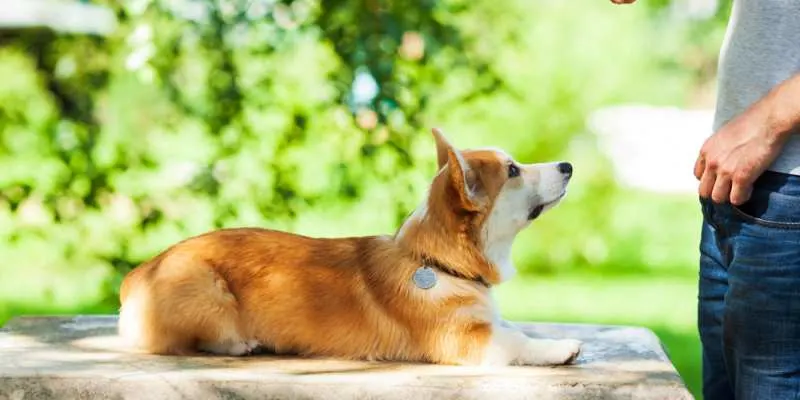Have you ever felt that your Corgi doesn’t love you like it did when it was a puppy? It doesn’t want to cuddle anymore – and even refuses playtime. Corgis are always up for cuddling and adventure, so this kind of behavior must have you wondering: Why does my Corgi hate me?
It’s definitely not a pleasant experience dealing with a pet that’s not showing any affection towards you.
Don’t worry; your Corgi doesn’t hate you. It just doesn’t like certain things that you’re doing. It can be everything – from daily chores to your way of showing love.
We’re here to shed light on the possible causes for your Corgi being angry with you. Owning a Corgi can be a challenge.
So, if you want to find out the reasons behind your Corgi’s “anger issues” and troubles, you should scroll down!

Possible Problems & Solutions
If you’re a Corgi owner, you need to be focused on your dog 24/7. Yes, this can be exhausting – and sometimes, even the minor things your pet does can get on your nerves.
Guess what? Your Corgi feels the same way.
These dogs may not show it right away, but there’s a good chance that the reason for the lack of affection is in the way you do certain things around the house.
After some time and repeated action, your Corgi will have no problem showing you that it doesn’t like something.
Some owners may overthink this and conclude that their Corgi hates them. That’s not true!
Believe us when we say that your Corgi is just trying to let you know that you should change a particular habit, for example. You must understand that you two don’t speak the same language, and your pup is having trouble communicating.
You may not be able to read their minds, but we’ve had so much experience with this breed that we’ve been able to list down the possible “wrong-doings” that cause your dog to dislike you – temporarily, of course.

1. Squeezing Your Corgi
Do you ever get the urge to hug your Corgi tight just because it’s fluffy and cute? Well, sometimes your squeezing can get on their nerves. They may even try to bite you.
Don’t get this wrong. Corgis are affectionate dogs, and they love cuddling with their owner, but you should know where to draw the line and say, “Okay, maybe I’m overwhelming my Corgi.“
Just like yourself, your Corgi can have bad days where it’s not in the mood for cuddling and playtime 24/7 – and suffocating it with love can only make matters worse.
Here’s what you can do: You can fix this by just petting your dog for a couple of minutes or even leaving them alone to chill out. There’s nothing wrong with some alone-time, even when it’s Corgis we’re talking about here.

2. Forcing Your Corgi To Be An “Extrovert”
By nature, the Corgi breed is social and very affectionate. But this doesn’t necessarily mean that your Corgi will “click” with anyone that passes by on the street.
If you had experience with other breeds or owned a dog previously to getting a Corgi, then you should know that forcing your dog to be an extrovert is not a good idea.
It may not seem likely to you, but your Corgi can easily develop phobias of strangers, loud cars, etc. That could frustrate them enough to display slight signs of aggression when outside.
If you don’t realize this soon enough, it may take it out on you.
Here’s what you can do: Try getting your Corgi used to other people being around it while it’s still a puppy. However, you shouldn’t go crazy with inviting guests to your home – this can cause the complete opposite.
See where your Corgi feels most comfortable, and take it there to relax and play. No dog likes to be surrounded by ten different people all at the same time.

3. Aggressive Discipline Methods
One of the most common ways any dog – not just your Corgi – will rebel against you is related to how you try to discipline them. Yelling is nowhere near a “normal” way of making your dog realize that it’s done something wrong.
Still, a majority of owners rely on aggressive discipline methods.
No dog likes to be mistreated, and incorporating punishments that could physically hurt them will undoubtedly make your Corgi love and respect you less. You need to understand that being strict is not the only way to teach your dog the importance of loyalty.
Here’s what you can do: When it comes to admonishing your dog, there are much more effective discipline methods. If you can’t think of anything at this moment, you could try:
- Ignoring them (the silent treatment)
- Squirting a water bottle
- Calling timeouts
- Distraction
Note that these are all temporary solutions. The key lies in training your Corgi properly.
Tips For Training Corgis:
You should know that the training process should start as soon as you bring your Corgi home – if it’s an adult – or after a few months have passed if it’s still a puppy.
Waiting too long can result in passive-aggressive behavior and a general reluctance to listen to you.
Here are some tips to consider during Corgi training.
| DO | DON’T |
|---|---|
| Start training as soon as possible. | Give your Corgi too many treats. |
| Reward your Corgi for good behavior. | Leave your Corgi alone for more than six hours. |
| Buy smart dog toys. | Skip vet appointments. |

4. Neglecting Your Corgi
Your Corgi may not be a born social robot, but this breed certainly doesn’t like to be alone for long. Corgis are so sensitive to perceived loneliness that they’ve developed a disorder related to that – separation anxiety.
For more info on the matter, check out Are Corgis Prone To Anxiety?
Whether it’s just a puppy, an adult, or a senior Corgi, it’ll always be up for an adventure with its owner – be it just a usual afternoon walk. So, if you leave your Corgi alone and locked up in your apartment or house, it’ll start feeling neglected.
While some Corgis let you know by being sad all the time, others can turn to occasional aggressive outbursts.
Here’s what you can do: The simple fix to a problem such as separation anxiety is not to leave your Corgi alone (for more than six hours). This breed requires your attention 24/7 – and if you’re not up to it, then you should rethink the entire idea of owning a Corgi.
Even Corgis need reassurance, and showing them love and spending time with them is the right way to do it.

Is Barking A Bad Sign?
Does the constant barking of your Corgi mean it doesn’t love you? Nope!
This breed barks a lot – but it’s not necessarily a sign of disliking you. If you’re an owner of a Corgi, male or female, you should get used to their bark. It’s loud, and it’s the thing that makes them unique.
Here are a couple of the most common reasons for the barking of your Corgi.
- The herding history: Once upon a time, Corgis were herding dogs, and their loud bark helped them look after the cattle and establish order. If you’re visiting the countryside, you might hear it a lot more often.
- A warning sign: It is pretty understandable that dogs bark when they sense or see potential danger, but Corgis take this to the next level with the intensity of their bark.
- Feeling sick or uncomfortable: It doesn’t have to be owner-related. Your Corgi will bark at the slightest sign of discomfort. Also, if it’s feeling some type of pain, this is their way of calling for help.
Take a closer look at your Corgi to find out what the potential problem is. When it’s not the herding history, there’s probably something that your Corgi needs – and it’s trying to get your attention by barking.

Summing Up
We hope you’re relieved to find out that your Corgi doesn’t actually hate you.
By going through this article, you’ve had the chance to pick up on some possible causes that are making your Corgi angry. As you can see, these are everyday things.
You shouldn’t just sit and worry yourself, thinking, why does my Corgi hate me?
Take a minute, and pay attention to the way you trained your Corgi. Did you leave it in the house for too long or forced it to do things it clearly doesn’t like?
There are simple solutions for each problem, and you just need to be patient with this breed.
If you’re worried about the barking – don’t be! That’s not necessarily your fault. It can be their herding instincts kicking in.
Read Also: How To Train A Corgi To Stop Barking?

